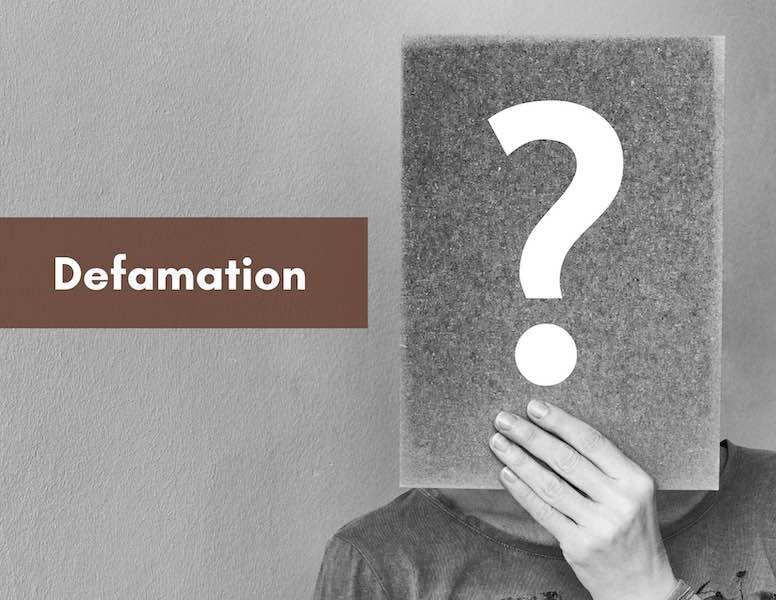Can You Sue a Person for Defamation over Insults?
by Andrea Kong Syuen Li ~ 11 April 2023
Insults can be hurtful, unkind and nasty. Sometimes, they may not even be true. It goes without saying that no one likes being on the receiving end of an offensive remark. However, does the law of defamation provide any remedies to those who have been insulted? Can a person sue another party for defamation based on insults? This article will address those questions below.
In a claim for defamation, there are 3 elements that must be satisfied namely, (1) the statement must be defamatory, (2) the statement has to refer to the plaintiff and (3) the statement must have been published to a 3rd party.
For a statement to be defamatory, it must not only have the effect of offending a person. The statement must also be capable of damaging one’s reputation or causing the defamed person to be exposed to hatred, ridicule or contempt.
A brief example of the difference between an insult and a defamatory statement can be seen below:-
Defamatory Statement
- Person A publishes an article in the newspaper which states that person B was relieved of his post as a director of a company because of certain “corrupt practices”. In this example, the statement is clearly defamatory as it gives rise to the defamatory meaning/imputation that person B engaged in bribery or is a corrupt person. It also implies that Person B is an unethical and dishonest person.
Insult
- Person C makes a comment on person D’s video saying that person D is stupid and fat. This is merely an insult / comment as it only injures person D’s feelings and does not affect his/her reputation.
Is an insult the same as a defamatory statement?
Insults are more often than not a product of an emotional outburst made with the intention of offending a person. To determine whether an insult amounts also to a defamatory statement, the test to be applied here is whether the statement made is capable of tarnishing one’s reputation or exposing a person to hatred, ridicule or contempt.
To put it another way, does the statement (or insult) have a tendency to lower a person in the estimation of right-thinking members of society generally? If it does not, then it would not amount to a defamatory statement.
In Hassnar Bin Mp Ebrahim v Sindin Bin Ranggangon [1996] MLJU 557, the Defendant accused the Plaintiff of stealing goats and also bribing certain parties so that no action could be taken against him. A dispute arose as to the actual words which were said. The Defendant argued that he had only said that the Plaintiff had stolen goats belonging to other people. He also explained that the reason why he had said this was because the Plaintiff said something earlier which caused the Defendant to feel humiliated, ashamed and angry.
The High Court reiterated the principle that if it is clear from the circumstances and context of the statement that the words were uttered out of anger or are mere vulgar abuse, they would not be deemed as defamatory. Relying on this, the High Court was of the opinion that the words uttered were only said in retaliation to the humiliation and shame that the Plaintiff had inflicted on the Defendant. In those circumstances, the words uttered by the Defendant were only intended to insult. Therefore, the words were not defamatory.
In Ayob bin Saud v TS Sambanthamurthi [1989] 1 MLJ 315, the High Court was of the opinion that the Defendant’s words, “I am surprised that a Chinese surveyor has charged RM1,450 whereas a Bumiputera asks for RM4,480 which is daylight robbery” were words of general abuse and not defamatory in nature. This was because they are not capable of causing reasonable men to avoid the offended person.
In the recent Australian case of Kermani v Seervai [2021] NSWDC 449, the words complained of included, amongst others, words such as “motherfucker”, arse licker” and “Taliban”. In reaching its decision, the Court held that in order to determine whether the words used were defamatory, it would depend on the nature of the insult and whether the statement conveyed more than an insult. The Court also decided that the mere presence of swear / vulgar words does not mean that a defamatory imputation would be conveyed.
In view of the above, it is clear that there is a need to distinguish between words that have a tendency to discredit a person’s reputation, against words which have been uttered out of anger and with the intention of offending another. Based on the decided cases, it can be seen that courts are satisfied that mere insults do not have the tendency of lowering an offended person’s reputation in the eyes of ordinary members of society. As such, they are unlikely to be deemed as defamatory unless it goes further to damage a person’s reputation in the eyes of another.
However, it is possible for a statement to be both an insult and also a defamatory statement. As long as the statement satisfies the requirement of being capable of injuring a person’s reputation or exposing him to hatred or ridicule, it is possible for the insult to also be defamatory.
Can victims of cyberbullying sue for defamation?
The topic of insults and defamatory statements would naturally also invoke the topic of cyberbullying. With the advent of the Internet, it has become increasingly common for people to be subjected to nasty or mean comments on the internet. Cyberbullying includes sending, posting or sharing negative or mean content about a person or corporation. It is usually carried out to cause embarrassment or humiliation to the intended person / corporation.
Questions have been asked as to whether victims of cyberbullying are entitled to sue their bullies for defamation. Similarly, this goes back to the issue of whether the statement in question amounts to a mere insult or is capable of bearing actual defamatory meanings.
Ultimately, one would have to look at the statement itself and apply the test mentioned earlier to determine whether the statement is capable of conveying any defamatory imputations. If a statement does not satisfy the test, then the claim for defamation would fail.
However, in the case of Suharnizan Binti Md Sidek v Noorazira Binti Pissal [2022] MLJU 2099, the High Court took a different stance from the other cases. In that case, the Plaintiff had sued the Defendant for the insults and abuse hurled at her during a Facebook Live cooking and demonstration session. The Plaintiff claimed that the words uttered by the Defendant implied, amongst others, that the Plaintiff is a person born outside wedlock, behaves like a pig, has a body like a pig and that she practices “khurafat” (something outside Islamic teachings).
The High Court held that the words uttered such as “anak haram”, “barua” and “mengamalkan khurafat” to be defamatory as they exposed the Plaintiff to hatred, ridicule and contempt. In addition, the Court also found that the Defendant had body-shamed the Plaintiff and that this must not be tolerated.
A thing to note here is that while the Court had focused more on the fact that the Defendant ought to be punished for body-shaming the Plaintiff, it was not made clear as to whether those body-shaming statements were defamatory or not. Notwithstanding this, it is our view that such statements (body-shaming insults) are not defamatory. This is because such statements were only made to demean the Plaintiff and do not convey a defamatory imputation.
Another potential avenue for victims of cyber-bullying is to consider bringing an action for harassment against the bully. In 2016, the Federal Court in Mohd Ridzwan Abdul Razak v Asmah Hj Mohd Nor [2016] 4 MLJ 282 introduced the tort of sexual harassment into the Malaysian legal system. In defining sexual harassment, the Federal Court referred to the test applied in general harassment cases and added that sexual harassment includes making sexual comments, displaying offensive pictures and making sexual threats. While sexual harassment is now actionable in Malaysia by virtue of the Federal Court’s decision, it is still unclear whether one is able to successfully sue for general harassment (as the case was on sexual harassment).
To conclude, defamatory statements tend to yield more detrimental consequences than mere insults. Insults can be hurtful and offensive but at the end of the day, if they are not capable of injuring a person’s reputation, a claim for defamation based on an insult will fail.

